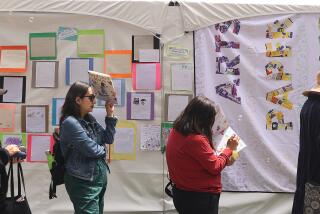‘Rhyming Life & Death: A Novel’ by Amos Oz
Rhyming Life & Death
A Novel
Amos Oz, translated from the Hebrew by Nicholas de Lange
Houghton Mifflin Harcourt: 118 pp., $23
Through his fiction and nonfiction the Israeli Amos Oz has been the witty and melancholy recorder of his country’s brilliant sufficiencies, along with the insufficiencies that shadow them.
Now Oz takes an equally witty, equally melancholy look at his own role as a writer. In part his new novella is a satire of the transactions between the author-celebrity and the readers who buzz around him. Eventually, because Oz the reluctant skeptic fails to conceal Oz the weary believer, satire gives way to a tribute to the modestly transforming power of literary invention.
“Rhyming Life & Death” does its initial impaling on an agreeably rickety scaffold. A fictional figure identified only as “The Author” -- we of course will recognize the voice of the real author -- submits to the dismal ritual of a literary talk.
Oz piles on the dismal: the audience, two-dozen-weak, sits sweltering (the air conditioning is broken) in the Shunia Shor and the Seven Victims of the Quarry Attack Cultural Center. (Oz slyly registers Israel’s nomenclatural fossilization of the early pre-independence struggle.)
And even before he arrives, the Author provides a page of expectable dumb questions. Does he write with a pen or on a computer? What does his ex-wife think of the female characters? Why did his ex-wife leave him? What did his last book mean?
We then get an acid view of the event. Yerucham, the sweatily effusive host, cites a novel by someone else as the Author’s. A literary critic recites a host of academic clichés (“the fundamental question of narrative authority,” “what is the actual meaning of the term ‘meaning’?” and the like.) Rochele, a tremulous woman in her 30s, reads out book excerpts with unfailing breathy reverence, even in the gritty realistic bits.
The Author takes morose note and picks out faces among the audience, devising an instant mocking caricature for each one. Yuval, a pimply adolescent poet, will surely insist the Author read his work. Miriam, a plump culture-lover, yearns to mother Yuval (or perhaps more). Pesach, a hard-bitten old Zionist, will denounce the negativity of new writers. Bartok, a wizened young man, is clearly there to sneer, judging from his expression.
When the event is over, though, and the Author goes for a long night walk, he begins to germinate stories out of those stereotype seeds. In a cafe before the event he’d noticed a weary waitress; mentally he’d devised for her a weeklong fling, as a teenager, with a soccer player who ditched her to go back to Lucy, his previous lover. Now the story develops: Ricky, as he names her, pines not for the player but for Lucy; and he invents a pitifully comic phone call seeking Lucy out.
Yuval evolves from a callow pest into a serious young poet to whom the Author imagines himself giving stern but useful advice. Bartok, no doubt as punishment for his sneer, is given an initial story as a loser in two successive jobs; as the Author’s fictional imagination expands, he becomes the patient caretaker of a hideously incontinent mother.
After the talk the Author, who finds Rochele “pretty but not attractive,” praises her reading. She is shy, overwhelmed; he walks her home, at one point trying for a tentative embrace from which she bashfully retreats. She turns down his offer to see her upstairs to her front door; he, certain that she is attracted despite her inhibitions, decides against making the effort and politely leaves.
So much for what happens. The writer takes over, and the Author devises an alternative story; this one a full-blooded enthusiastically mutual seduction, sexy but fumbling on both sides. It is a small masterpiece of psychological tangle.
Perhaps the best literary transformation goes back, once more, to the cafe. The Author had noticed two gangster types muttering to each other. They mention a businessman, Ovadya, who built up a shady fortune to become an ebullient, free-spending pleasure-seeker, and who is dying of liver cancer.
The Author goes to work. He describes Ovadya, pitifully shrunken, befouling himself when his nurse neglects him. He takes another step: The soccer player brings both Ricky and Lucy to visit so they can comfort him with a pair of sexual caresses. And a final step: The dying man has a vision of the Galilee, “far away and peaceful . . . the air is brilliant, polished, and the view as far as the mountain slopes is bathed in limpid light.”
Along with the novella, Oz’s publisher has issued “The Amos Oz Reader.” It contains excerpts from his fiction, essays and memoirs. They provide a taste; Oz, whose strength is cumulative, is perhaps better read at length. But Robert Alter, the distinguished literary and biblical scholar, has written a brilliant introduction, linking the daylight world of Oz’s nonfiction with the darker inwardness of some of his novels. And no one has put better the evolution of Oz, who belongs to the Peace Camp, reacting to the bitter events of recent years.
For a long time, Alter writes, Oz, a lifelong Zionist, had seen the clash of the Israelis and Palestinians as a matter of “right against right.” More recently, “he has been led to wonder whether this might also be a clash of wrong against wrong.”
Eder, a former book critic of The Times, was awarded a Pulitzer Prize for criticism in 1987.
More to Read
The biggest entertainment stories
Get our big stories about Hollywood, film, television, music, arts, culture and more right in your inbox as soon as they publish.
You may occasionally receive promotional content from the Los Angeles Times.






